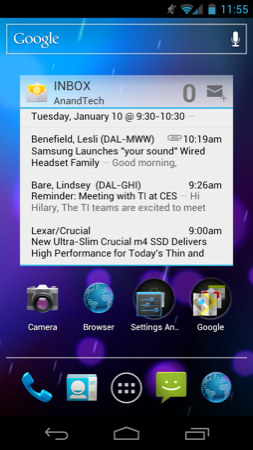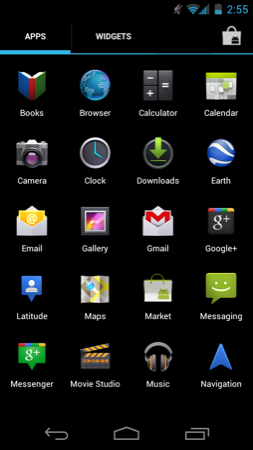Samsung Galaxy Nexus & Ice Cream Sandwich Review
by Brian Klug & Anand Lal Shimpi on January 18, 2012 1:34 PM ESTGoogle employs more than 20,000 people worldwide and the number of them working on Android are in the single digit percentage range. Google's business is search, but it has always had aspirations of more. Android isn't just a chance to capitalize on mobile search for Google, it's also an opportunity to grab power in the next era of personal computing. If you believe that smartphones will eventually replace mainstream PCs, who wouldn't want to be to smartphones what Microsoft was to PCs in the early 1990s?
Previous versions of Android have been cautious, evolutionary steps along a path to being a more open/flexible alternative to iOS. Starting with Honeycomb (Android 3.0) however, Google began to step out of the shadow of its competitors and really start to define Android as a mobile computing platform. Honeycomb was limited to tablets but its successor, Ice Cream Sandwich (Android 4.0), would bring unification to Android across both tablets and smartphones.
Today we look at both ICS and its launch vehicle, Google's Galaxy Nexus.
The Android vs. iOS Debate
It's very clear to me now more than ever that Apple and Google have completely different goals with their mobile OS strategies. Excluding the unclear strategy behind Chrome OS, Android is pretty much Google's primary operating system. The unified tablet/smartphone strategy behind Ice Cream Sandwich makes sense because for Google to succeed in the OS business it needs to deploy Android on everything from smartphones to notebooks. We've already seen the strengths in having a smartphone platform with a strong app ecosystem. Things become even more appealing if you have a phone, tablet and PC that all run the same OS and apps. As Android is Google's one-size-fits-all operating system, it needs to have a broader and slightly more ambitious focus than iOS otherwise it risks losing the race in the long run.
Apple is in a different position. It already has a successful desktop/notebook OS that is continuing to grow. While iOS has been a runaway success for Apple, the Mac OS X platform is a solid option for any user who needs more than their iPhone or iPad can provide. The two OSes may converge or at least borrow heavily from one another, but in the interim they can remain independent. If you need more of a computing experience Apple is happy to sell you a Mac. If you want the it-just-works appliance experience in your phone or tablet, Apple has a whole bunch of iPhone/iPad configurations to offer you.


ICS isn't a step towards iOS. If anything it proves that Google is committed to its own trajectory. Android is an OS that, although more closed than many would like, still allows more flexibility than iOS. You can sideload apps not purchased in the Market. The file system isn't completely hidden from you. You can even override the default zoom level on web pages. Apple and Google both pour tons of time and research into figuring out the best way to do something. And, to be honest, I feel like Apple generally does a better job of "getting it" for the very mainstream consumer. Rather than attempt to make the perfect mold however, Google gives you one that's a bit more flexible.
I've said this before but I do believe that Apple is trying to deliver more of an appliance experience, whereas Google is providing you with a modern take on a traditional computing experience. If the appliance is a smartphone, then both approaches are equally capable - it's just a matter of personal preference.
What's new in ICS really falls into one of three categories:
- Improvements in UI frame rate due to OpenGL ES rendering (non-skia) path
- UI tweaks
- New features
Nowhere in this list is a fundamental change in the way Android works. I feel that this is a very important point to understand and likely the cause for lots of disagreement when it comes to just how impressive (or not) ICS is.
ICS is smoother, more polished and has its own set of new features that make it a significant step forward for Android. What ICS is not however is an outright clone of iOS. If you prefer the iOS experience to Android, ICS will do nothing to change your opinion. If all you were missing from Android was a smoother UI, then its fourth major release should be almost everything you could ask for.










185 Comments
View All Comments
Brian Klug - Thursday, January 19, 2012 - link
Interesting. I originally picked S5K4E5 family as being the likely choice - as it's the BSI equivalent, and though that was what was inside until I decompiled/dug around inside the ducati-m3.bin file as noted in the review.You'll see numerous references to "S5K4E1G" and none for "S5K4E5" which is the BSI version. EG:
"CSI.COMPLEIO�¿F¿MSP.NEW_SENSOR�¿S5K4E1GA�¿F¿S5K6A1GX03�¿MSP.NEW_LENS�¿F¿VM149C�¿MSP.NEW_CSI�CSI2A�¿FCSI2B"
It could very well be BSI since they've x-rayed it.
-Brian
tom5 - Thursday, January 19, 2012 - link
Official Samsung site says SGS II has quad band 3G and Galaxy Nexus has penta-band 3G, so there's a difference in GSM connectivity:http://goo.gl/gvIWV
Stas - Thursday, January 19, 2012 - link
I appreciate the thoroughness in this review, Anand.Interesting, however, how I find so many things about the software completely irrelevant to someone who just can't leave things vanilla. Browser performance and features, launcher scrolling, screenshots, on-screen keyboard, etc. None of those things are in their original Android form on my phone (SGS2). Some issues have been addressed by Samsung, some by XDA developers, some by myself. As a result, I believe I have the perfect phone on the market (for me). Reading every section of this article, I kept finding myself thinking, "Heh, my phone doesn't have that problem," or, "Mine does that even better," or, "would suck to have that phone instead of my Galaxy."
I always thought advancement in tech = replacing devices sooner. However, after reading this review, I have no desire whatsoever to replace my current phone with the new flagship. I always get that feeling when I read a video card review, CPU review, SSD review, etc. But I feel like my phone lacks nothing, and I will stick with it for a long while. Customizing and tweaking software to your own taste, making it feel just right is the most important aspect of an electronic device that provides so much interaction. I guess that's why I almost feel handicapped on a stock Android phone or, especially, iPhone. The devices just feel so clunky and unrefined.
Thank you, if nothing else, for helping me see a different perspective on things :)
Lucian Armasu - Thursday, January 19, 2012 - link
1. Can you re-check and confirm if swiping tabs off in the task menu, actually KILLS the apps, or it just takes them off the list? Because I've heard before that it doesn't kill them.2. The battery tests, especially the Wi-Fi ones, were they done with 3G and LTE on?
silow675 - Thursday, January 19, 2012 - link
"At 720p, which happens to be the GN's native resolution, the OMAP 4460 is a bit faster than Tegra 2 but not significantly so. The more important thing to keep in mind is just how much faster Tegra 3's GPU is by comparison"I don't understand this remark. The chart that's posted for the 720p offscreen renders don't have a Tegra 2 device. In the RightWare charts the Galaxy Nexus scores much more than "a bit faster" than the Tegra 2 devices. And to my knowledge no Tegra 2 smartphones are offered at native 720p resolution.
I also checked the AT Bench database and couldn't find any Tegra 2 benchmarks to compare. Do you guys have some unposted numbers?
RobElk - Thursday, January 19, 2012 - link
You guys do a great job. Love the attention to detail in your review. Thanks.DrKlahn - Thursday, January 19, 2012 - link
I found this comment interesting. I have had the phone since launch day (VZW) and have yet to notice any lag hitting the virtual buttons. Perhaps I am just not as sensitive to it or some other process on your test phone is affecting it. I have got the phone to lag doing some very intensive tasks on occasion, but it's very infrequent. My chief complaint has been the volume which I remedied with a free app (Volume+ with the +2 setting). Otherwise I give the phone very high marks. I have no real desire to root or tinker with it yet, the stock experience is excellent.peokuk - Thursday, January 19, 2012 - link
for the font comparison, why not 'the quick brown fox jumps over the lazy dog'? using cat and jumped leaves out the letters 'g' and 's'...http://en.wikipedia.org/wiki/The_quick_brown_fox_j...
DanSmith - Thursday, January 19, 2012 - link
No one has actually said it yet so I will. Good review guys, in depth and informative as always.Thanks for your hard work.
Dan
DanSmith - Thursday, January 19, 2012 - link
Actually, someone already has! Seems the internet is not completely populated by haters. :)